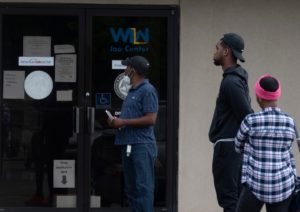Economic inequality is of course nothing new, and is widespread throughout the world, but as a recent article in the NY Times points out, the virus has exacerbated that inequality:
Workers who are college educated, relatively affluent and primarily white able to continue working from home and minimizing outdoor excursions to reduce the risk of contracting the virus. Minorities [are] suffering both higher death rates and more financial harm. In New York City and across the country, black and Latino Americans are dying at higher rates from the virus than whites. Economic polling data shows they are also losing their jobs and income to an outsize degree.
Those who are affluent are able to isolate themselves and suffer little economic pain. That might mean moving to a second home in a secluded area or even renting an entire hotel for family and friends, and flying to those locations on a private jet. On the other side of the income gap, many people in the US are applying for unemployment (now over 30 million) and waiting in long lines at food banks.
This disparity has not gone unnoticed, particularly as rich or famous Americans express their solidarity with their fellow citizens in social media, leading to considerable backlash. Hollywood billionaire David Geffen, for example, posted an Instagram photo of the sun setting behind his 454-foot yacht in the Caribbean, captioning the photo: “Isolated in the Grenadines avoiding the virus. I’m hoping everybody is staying safe.” He soon after made his account private.  The backlash was similar when Madonna posted a video on Instagram of herself in a milky bath sprinkled with rose petals, with the comment that the coronavirus is “the great equalizer.”
The backlash was similar when Madonna posted a video on Instagram of herself in a milky bath sprinkled with rose petals, with the comment that the coronavirus is “the great equalizer.”
Ellen Degeneres, broadcasting from her mansion, compared the situation to being “in jail” – many comments ensued, with people wishing for a similar jail cell.
States in the US, following the urging of President Trump, are starting to re-open businesses. As the NY Times article points out, this is likely to accelerate disparities:
Those who are lower paid, less educated and employed in jobs where teleworking is not an option would face a bleak choice if states lift restrictive orders and employers order them back to work: expose themselves to the pandemic or lose their jobs.
Not all economists are convinced that re-opening will necessarily result in swift economic recovery. Until therapeutic treatments or a vaccine are developed or testing has ramped up much higher than is currently the case, it seems unlikely that many will have the confidence to resume their previous shopping, eating out, travelling, or other activities. Meanwhile, it is those most at risk for infection (members of minorities, lower-income whites) who will bear the burden of having to put themselves and their families in danger by going back to work in conditions that often preclude effective social distancing or wearing protective equipment.


